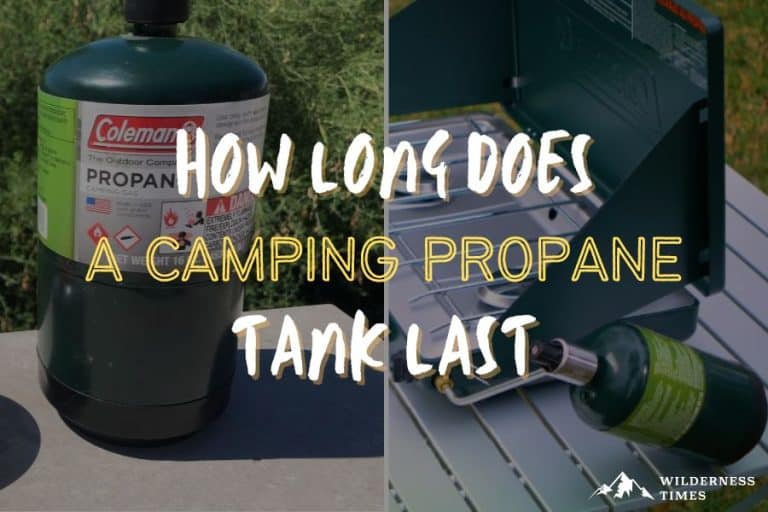Have you ever been in the middle of cooking at your campsite and suddenly wondered, “How long does a camping propane tank last?”
Well, unfortunately, it doesn’t last forever.
Propane gas can be a great way to fuel your camping stove, but how much you need and how long it will last depends on the trip duration, weather, frequency of use, BTUs of the burner, etc.
On average a typical small 1 lb or 16 oz camping propane tank will last about 2 hours with continuous burn.
A larger 5 lb camping propane tank can last up to 8 hours of continuous burn time.
In this article, we’ll talk go into more detail about how long camping propane tanks last, how to keep them lasting for as long as possible, and how to safely store them.
Table of Contents
ToggleHow Long Does A Camping Propane Tank Last?

After a long day of camping, a warm meal on a hot stove can be a game changer.
Propane gas is a great option for your camping stove because it’s easy to use, portable, and really affordable.
Whether you’re on a car camping trip or a longer backpacking trek, there’s a propane canister that’s right for you.
Check out the table below to learn more about the different sizes of propane and how long they’ll last you.
Understanding Camping Propane Tanks
There’s a large variety of propane canisters and tank sizes. Some can even get up to 100 lbs!
In the table below, we’re breaking down the four sizes most commonly used for camping trips.
TANK SIZE | AMOUNT OF PROPANE | BURN TIME |
1 lb | .25 gal / 32 oz | 2 hours |
5 lb | 1 gal / 128 oz | 8 hours |
11 lb | 2 gal / 256 oz | 16 hours |
15 lb | 3.5 gal / 448 oz | 28 hours |
20 lb | 4 gal / 512 oz | 32 hours |
Keep in mind – anything above 5 lbs will be too heavy and cumbersome to pack on a longer trek.
If you find you need more gas than the 5 lb container can hold, you may need to transition your plans to a car camping trip.
How Long Does a 1 lb Propane Tank Last?
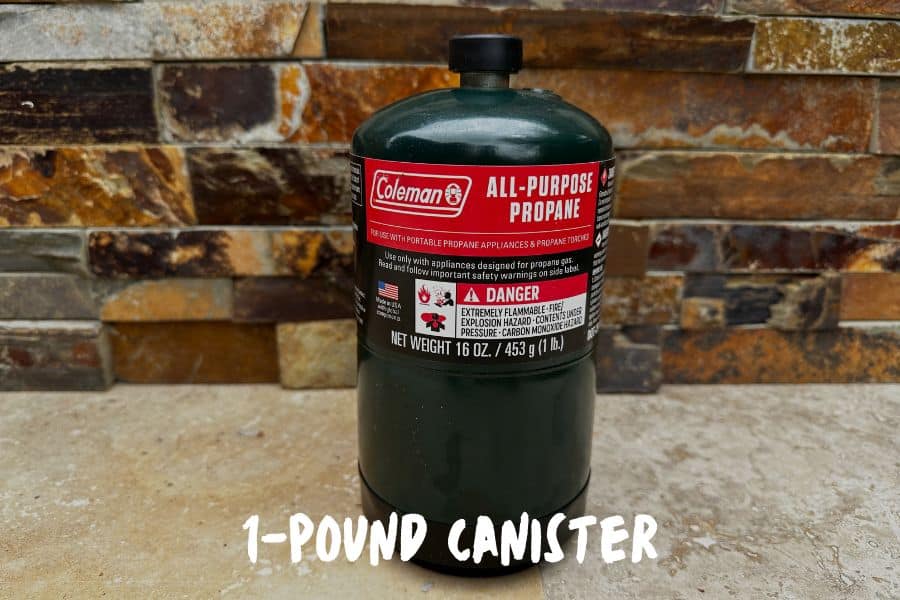
The most commonly used canister for backpacking, the 1 lb canister will serve you well throughout your long trek or camping trip.
I prefer this size because I can distribute the weight of the canisters in my backpack.
This way, I don’t have to carry all the weight in one location.
This can be especially helpful if you have multiple people on your trip, since you can divide the weight up even more.
A single 1 lb, 16 oz canister will last you up to 2 hours of burn time.
If you’re not using your stove extensively on your excursion, you can get away with only bringing 2-3 of these per trip, depending on length.
How Long Does a 5 lb Propane Tank Last?
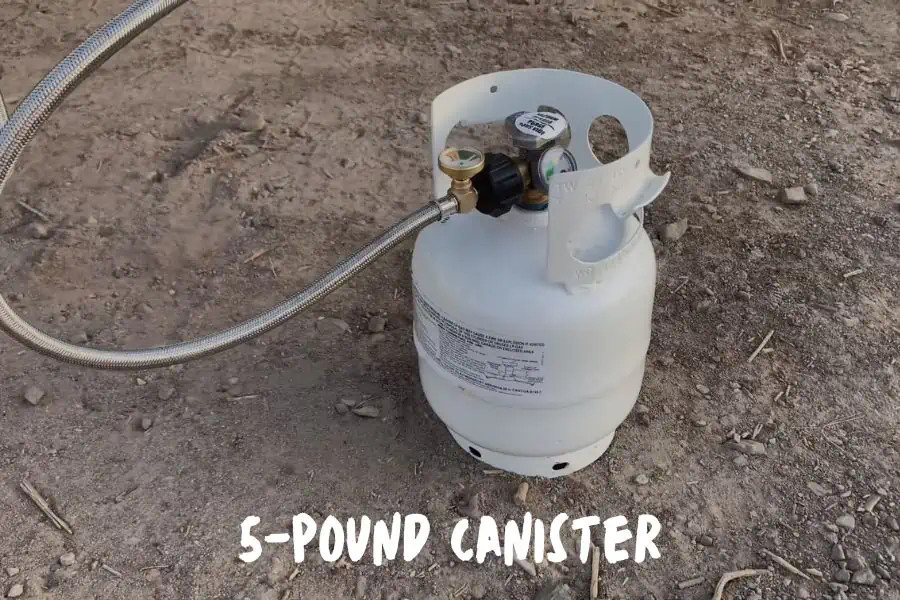
Slightly larger than the 1 lb canister, this size should only be used if you’re planning on using a lot of fuel on your longer trek.
It can get fairly heavy, and the weight can’t be distributed throughout your pack.
So, it isn’t always worth it to bring.
A 5 lb propane tank will last you up to 8 hours of burn time.
How Long Does an 11 lb Propane Tank Last?
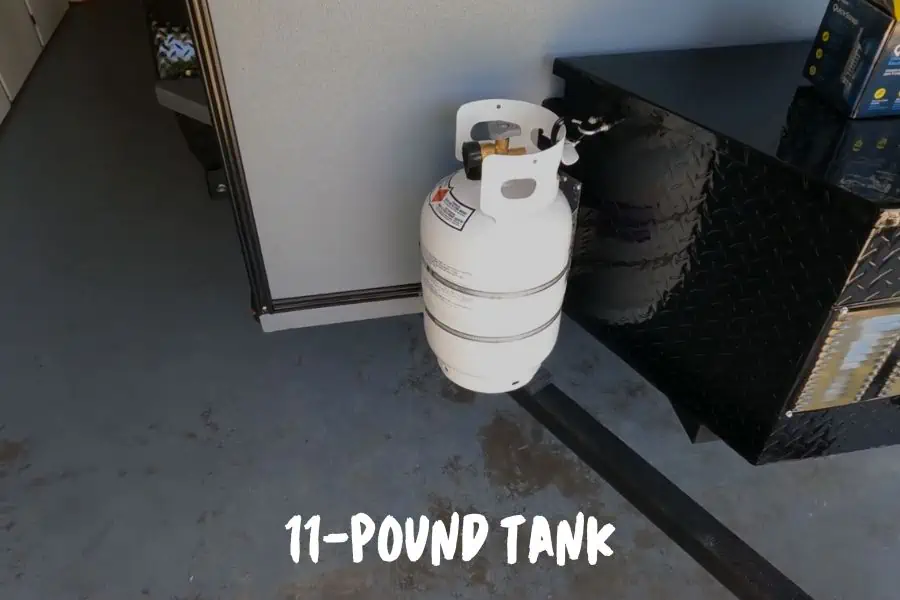
Tanks that are 11 lbs and over should be reserved for car or RV camping because they are too heavy to bring with you on the trail.
With up to 16 hours of burn time, 11 lb tanks can be a good option for longer trips.
They’re great if you think you’ll use a good amount of fuel over a moderate period of time and won’t have options for a refill.
How Long Does a 15 lb Propane Tank Last?
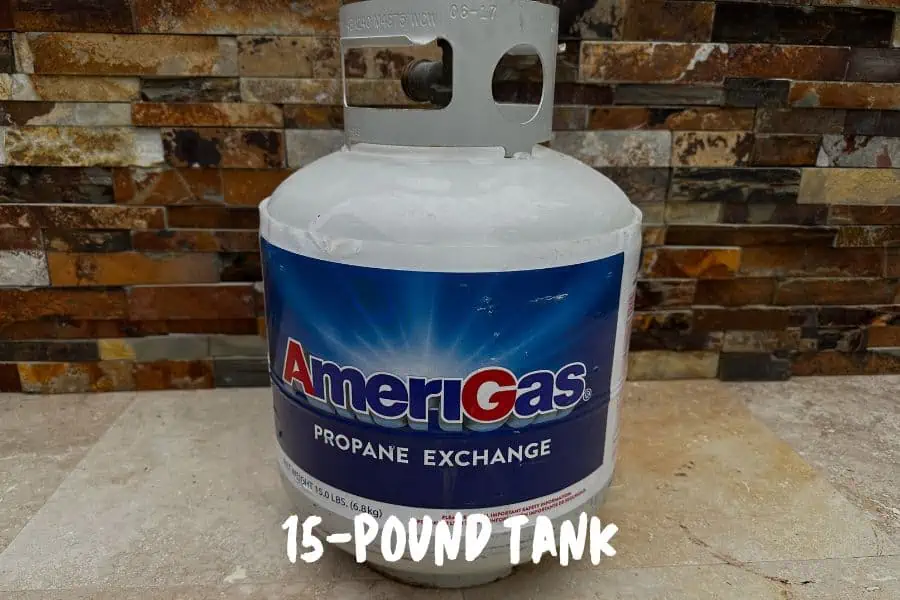
Tanks that are 15 lbs and above are great candidates for long car camping trips or RV adventures.
Additionally, they will last you anywhere from 25-30 hours of cook time, so they are especially great for adventurers who like to cook!
You can also even upgrade to 20 lb tanks and get 32+ hours of cook time.
Factors Affecting The Lifespan Of A Propane Tank
Here are some things to keep in mind that could shorten the amount of burn time your propane tank will give you.
Camping Propane Tank Size
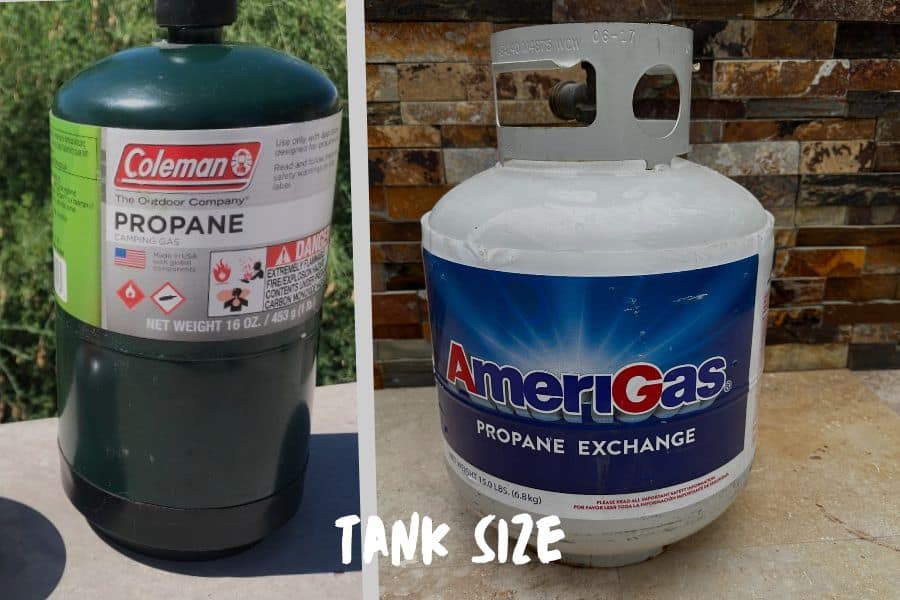
The larger the propane container is, the more gas it’ll be able to carry – and the longer it will last you on your trip.
I recommend picking your tank size based on your portability needs.
If you’re headed out on a longer trek where you’ll need to carry everything on your back, the smaller sizes will serve you best.
These smaller canisters are especially great for backpacks because you can distribute the weight.
If you’re car or RV camping and don’t have to carry anything too far, bringing a heavier and larger propane tank can be more convenient.
Plus, it’ll last longer.
Efficiency Of Your Camping Equipment

As your stove gets used over the years, it will gradually become less efficient at using gas.
This happens because the materials develop micro-tears around the openings of the equipment, which gas can leak out of.
Because of this, older stoves will use more gas than newer ones. This will use up gas even quicker.
If you’re worried about using too much gas, make sure that you’re using a stove that’s in good condition.
This way, you’ll use gas less quickly.
Weather Conditions
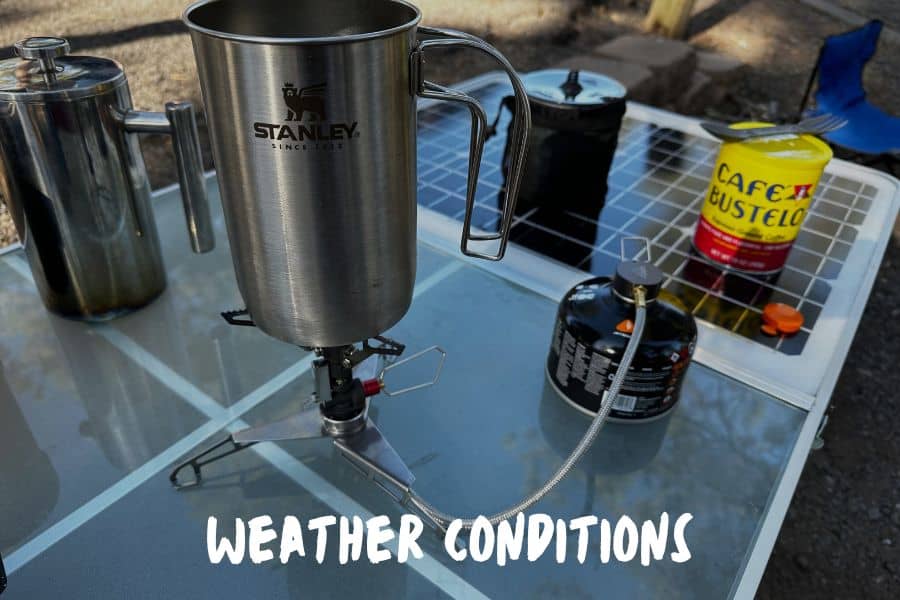
Propane is a great fuel option because it works efficiently in the majority of weather conditions.
This means you can use it in the heat, rain, and cold weather.
The only condition you can’t use propane in is extreme cold.
When propane hits -44°F, it shifts from gas to liquid and becomes unusable.
Frequency Of Use

This one is fairly simple, but definitely still worth mentioning! If you use your propane more, you’ll run out of it faster.
Most campers will use their stove twice a day: once at breakfast to heat up water or coffee, and another time at dinner to heat up their food.
If you’re trying to save gas on the trail, I recommend doing your best to skip the breakfast stove use, so that you can save that portion of gas.
For dinner time, I recommend preparing all of your dinner ingredients before you start cooking.
This way, you won’t have to waste time – and fuel – chopping ingredients for dinner while the stove is already running.
Tank Condition
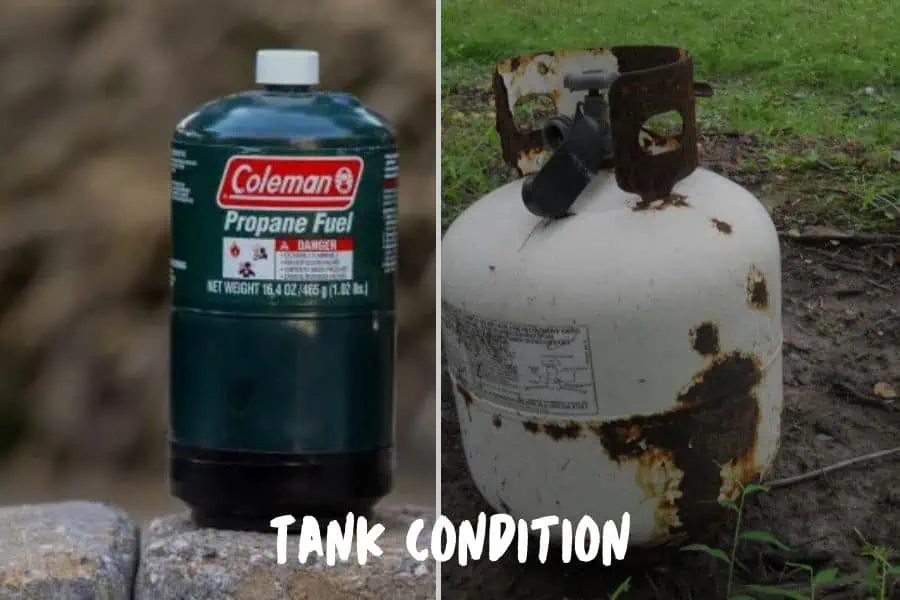
Propane can be an extremely dangerous substance if not handled correctly. This includes the canister or tank in which the propane is stored.
If your propane container starts to get rusty, or worn in any way, it’s no longer safe.
You’ll have to replace it and potentially discard all of the remaining fuel left inside.
How To Extend The Lifespan Of Your Propane Tank
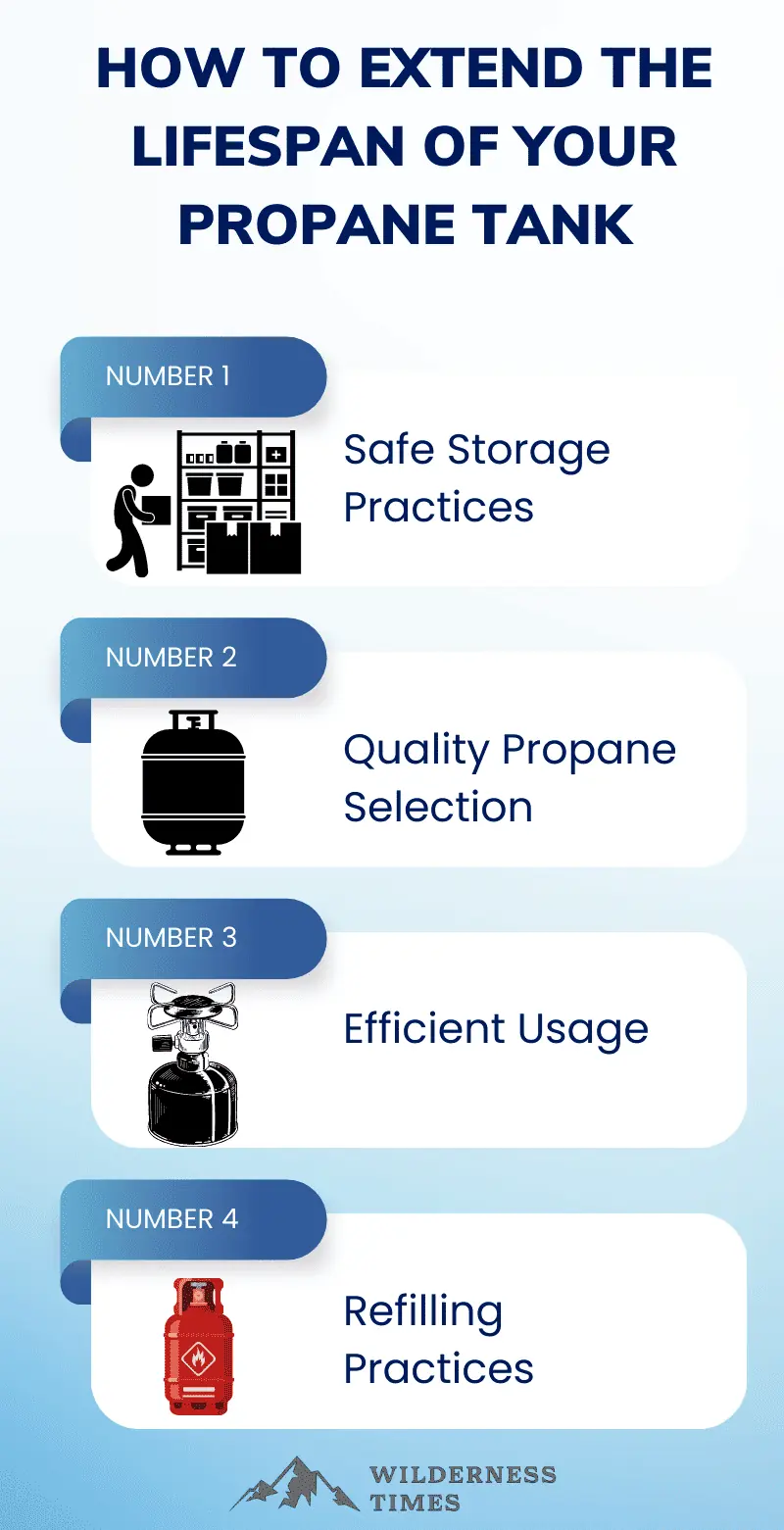
Propane tanks themselves are great containers that can last you a really long time – if used and taken care of properly.
In fact, some metal propane tanks can last anywhere from 30-40 years!
For both your and your tank’s sake, it’s incredibly important that you follow all the manufacturer’s instructions for safe handling of propane.
And always consult a professional when you have questions!
In addition to proper usage, there are a few other factors that are crucial in preserving your tank for many campouts to come.
Safe Storage Practices
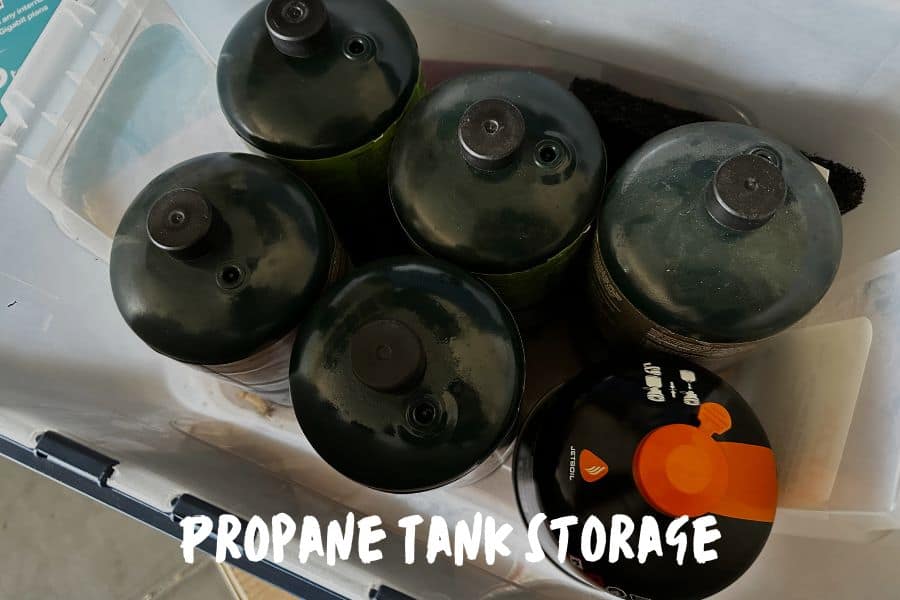
Propane can become dangerous if stored improperly.
To keep yourself safe, always make sure that you’re storing your propane tanks in well-ventilated, cool areas.
You should also keep them away from any potential exposure to heat or sun.
Having a well-ventilated area is important because propane can leak gases that make it difficult to breathe.
If these gases were to leak into an enclosed space, it would be incredibly dangerous for anyone in that space.
Therefore, always keep your propane in an open area with good airflow. Ideally, it can be kept somewhere outside.
Additionally, propane is sensitive to heat and pressure changes.
If a propane tank is exposed to heat, the change in temperature will cause the pressure inside the tank to rapidly increase.
This could result in an explosion.
Quality Propane Selection
As with most fuels, there are varying levels of quality to choose from.
While it can be tempting to go for the cheapest option, it can actually be worth your money to choose one of the higher-quality options.
This is because the higher quality fuels will not wear down the materials of your tank as quickly.
This allows you to keep using the same containers for longer.
Efficient Usage
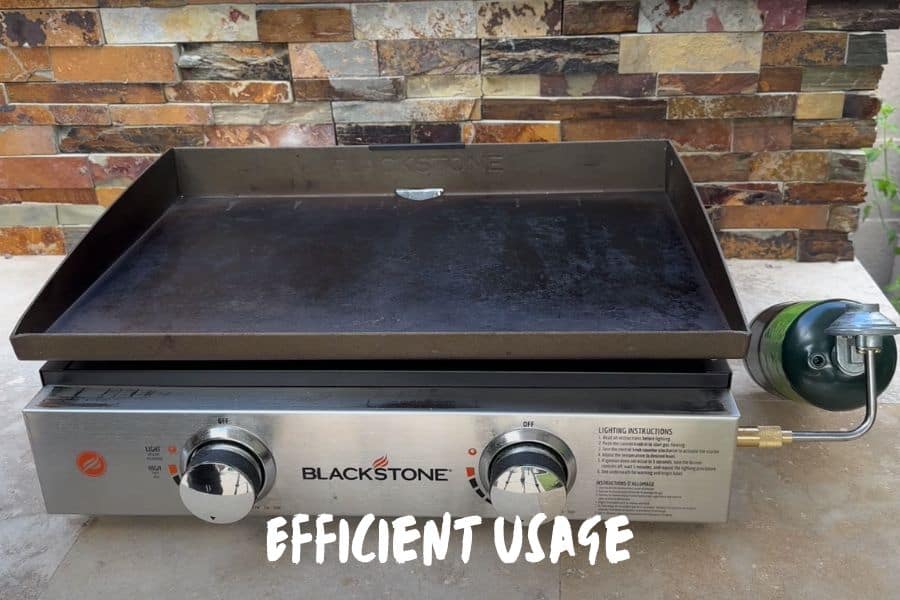
There are specific ways to set up your stove so that it conserves its heat most effectively, requiring less fuel. This is called a “closed stove system”.
Using a closed stove system when cooking is a great strategy for conserving fuel.
This system uses barriers to block the wind and surrounding environment from the stove itself.
This structure allows the stove to conserve its own heat, rather than losing it to the surrounding environment.
Most stoves will come with some form of barrier that is either part of the structure itself or piece of gear you can place around the structure.
If your stove doesn’t have one, you can find a wind-blocking structure at your closest outdoors store.
Refilling Practices
Most larger propane tanks can be refilled. Smaller canisters must be specifically labeled as refillable to do so.
However, refilling practices that limit the amount of spillage and lost fuel are most efficient.
If you have refillable gas canisters, you can use a Propane Refill Adapter.
This piece of equipment will attach a smaller gas canister to a larger propane gas tank and transfer fuel from the tank into the canister.
Using a Propane Refill Adapter is a great way to cut down on waste by reusing each canister more than once.
When using this refill adapter, make sure you’re wearing hand and eye protection and working in a well-ventilated area.
FAQs
How Long Does a Coleman Propane Tank Last?
Like any other 1 lb or 16 0z propane canister, Coleman propane tanks will burn for 2 hours continuously.
This means that if you cook for 20 minutes twice a day, you have about 3 days’ worth of fuel.
Can A Propane Tank Explode In The Sun?
Unfortunately, yes. It’s possible for a propane tank or canister to explode in the sun, or in extreme heat.
To avoid this, make sure to keep your propane tank in cool, shady, and well-ventilated areas.
What Happens If You Overfill A Propane Tank?
Overfilling a propane tank or canister could result in combustion.
If you find that you have an overfilled propane container, place it in a shady, well-ventilated area and contact a gas specialist.
How Long Can You Store A Propane Tank?
Metal propane tanks can last for decades! As long as you are maintaining the tanks well and keeping them in the appropriate storage, they can last anywhere from 30-40 years.
Smaller propane canisters will have an expiration date stamped near the mouth of the container.
Usually, this date is 12 years after the production date.
Once your canister has reached its expiration date, it should be inspected for safety.
If your canister passes this safety test, it will be usable for another 5 years, when it will need to be inspected again.
Can Propane Tanks Be Used In All Weather Conditions?
For most weather conditions, your propane tank will work just fine.
However, in extreme cold (around -44°F), propane tanks will hit their cold limit.
At this point, the liquid gas will turn into liquid and won’t work as effectively.
Final Thoughts
Propane fuel is a great option for your next campout. Next time you’re headed out on the trail, try out using propane on your camping stove.
You’ll find that it’s super easy to use – and really affordable! Feel free to use this article as a how-to for any use, storage, or maintenance tips.
Next up: How Long Do Isobutane Canisters Last?
More on Camping Fuel & Stoves:


